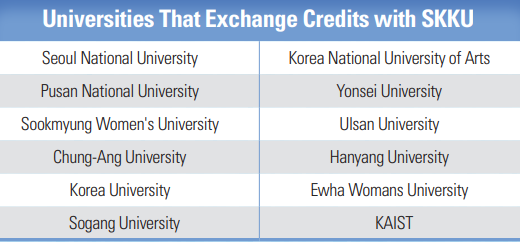As the overseas exchange program has been restricted due to the coronavirus disease 2019 (COVID-19), the domestic student exchange program is receiving attention as a remarkable substitute. The student exchange program is meaningful in that it provides various learning opportunities by exchanging students and lectures between universities. However, few students use the program due to insufficient promotion and complicated application processes. Therefore, the Sungkyun Times (SKT) will introduce the domestic student exchange program, its advantages and limitations, and suggestions for future improvements.
Student Exchange Program That Breaks Down Walls Between Universities
What Is the Domestic Student Exchange Program?
The domestic student exchange program is a program that allows students to exchange credits by attending classes at partner universities during a particular semester. The program first began in 1972 to activate exchanges of education, research, and students. It provides students opportunities to take lectures over the walls between universities. The process of application can vary from school to school, but most of them follow a common procedure. First, students should check the lecture curriculum, lecture plan, and the application period following the notice of their university. After that, they should check how grades are calculated. If students choose to take major classes, they should also check whether the lecture would be recognized as a major course by the university they are at. The way credits and grades are given also follow the regulations of the university they belong to.
Domestic Student Exchange Program of SKKU
Sungkyunkwan University (SKKU) runs the exchange program with several universities for open education. After completing more than two semesters, Kingos can apply for the program. Also, it is not possible to take the exchange program during a term and seasonal semester if a student is in the final semester. Kingos can attend exchange classes within credit limits per semester. However, if they choose to take courses both at SKKU and at another university, the credit limit for another university goes down to one third. When taking the program during the seasonal semester, they can take classes within six credits per seasonal semester. Kingos can apply for the program through the online system GLS one or two months before the semester starts. For reference, Kingos should meticulously check the application period from the notice on the SKKU website as the application deadlines vary by school. Also, students must submit a preliminary report, a process to confirm if a lecture is recognized as a major course before the exchange, and a certification report, a process to approve final grades after the exchange, to set grades.

Advantages and Limitations of Domestic Student Exchange program
Advantages of Exchange Program
01. Distinctive Lectures
Students have the opportunity to take classes that do not exist in their own school. For instance, students at SKKU can take lectures on theology and anthropology at other universities since SKKU does not have those majors. Conversely, students from other universities can sign up for our exchange program to take the classes offered at the College of Confucian Studies and Eastern Philosophy, which only exists at SKKU. According to an interview with a student named Kim (Sophomore, Department of Economy), who participated in an exchange program with the Korean National University of Arts (KARTS), with the help of the exchange program, he could take the “Basic Art Theory” lecture he wanted since KARTS provides intensive courses related to arts.

02. Various Experiences
Through Contacting with Other Schools When the student exchange program occurs offline, students can enjoy new experiences, visiting different campuses and meeting new people. If they take courses related to their major, they can get to know more people interested in the same field and share some information. Even if they take courses unrelated to their career, it can provide an opportunity to broaden their perspective. Also, many students choose a university close to their home when they take the program. By attending the nearby school, students can feel more convenience and manage their time more efficiently. Lately, most exchange programs have been carried out online due to COVID-19. Nevertheless, many students could feel a new atmosphere by taking online classes of another university with students they had never met before.
Limitations of Exchange Program
01. Inconvenience due to the Absence of Integrated Community and System
The biggest limitation of the exchange program is that when students have problems while taking other universities’ lectures, there is no integrated community to ask other students. When students come across minor questions or problems, they usually interact through on-campus communities such as Everytime or group chat. However, students from other universities have limited access to these on-campus communities. Thus, they always have to contact the teaching assistant or professor to solve the problem. Students have complained that some questions were too trivial to ask professors. They said there was no way to ask how to make up for the classes that they missed. As the number of online classes increased due to COVID-19, exchange students have no way to inquire or check the problem of online connection errors in real-time classes using online platforms such as Zoom or WebEx. Moreover, it is extra hard for some students since each university uses a different learning platform. The absence of community can make some students confused about the way to register for courses. If students cannot take the course they desire, the meaning of the exchange program fades.
02. Lack of Program Advertisement
Another problem is the lack of program advertisement. According to “The Research on the Improvement of University System and Invigoration of Domestic Student Exchange Program” done by the Ministry of Education (MOE) in 2016, 29.7% of students responded that the main factor disturbing the exchange program is “the lack of information about other universities’ courses”. The 2nd highest factor, with 24.4%, was “students’ indifference”. These problems are caused as universities are not advertising the program actively. In the case of SKKU, the partner universities and application deadlines are cumulatively updated on the website, but it does not provide any notice about updates. Therefore, students have to keep visiting the website to check if there is any new information. SKKU’s mobile portal application, KINGO-M, also does not send a message about the program. Several universities only list partner universities and courses and leave students to find information on their own. This kind of passive way hinders improving the exchange program.
How to Improve the Exchange Program
Building an Integrated Community and System
The fundamental solution to the absence of an integrated community is to utilize on-campus applications such as “Skkuter” to open communities and group chats for exchange students. This can help overcome limitations of access and provide a fair learning environment for exchange students. Student councils of universities should actively promote students to utilize the application so that it could be used for all students and act as the main community. Furthermore, via the autonomous cooperation of universities, the MOE should open a website that provides links to different register platforms and make promotional videos for guidance. This way would help students solve problems with confusing registration systems and school facilities
Expansion of Program Advertisement and Information Provision
According to the research by the MOE, 43% of students responded “agree”, and 34.4% responded “strongly agree” to questions about the “vitalizing the domestic student exchange program”. The positive response takes up most of the opinions, so it is expected that if the program advertisement and information provision are expanded, students will participate actively. To vitalize the program more actively, role division between universities and the MOE should be harmoniously achieved, and universities should try to share information voluntarily. They should strategically select popular courses and promote them to attract students. Each university should develop specialized major courses and pursue open education by getting help from other universities. Additionally, the MOE should remove the factors that hinder the exchange program and develop systems so that communication between universities becomes more active.

The domestic student exchange program is a good opportunity for students who have not experienced face-to-face classes or various kinds of learning environments. However, this system is being poorly promoted, and students are reluctant to utilize it due to the complicated registration process. In order to improve the exchange system, universities should build an integrated community and advertise the system actively, which will lead to more open education for students.
